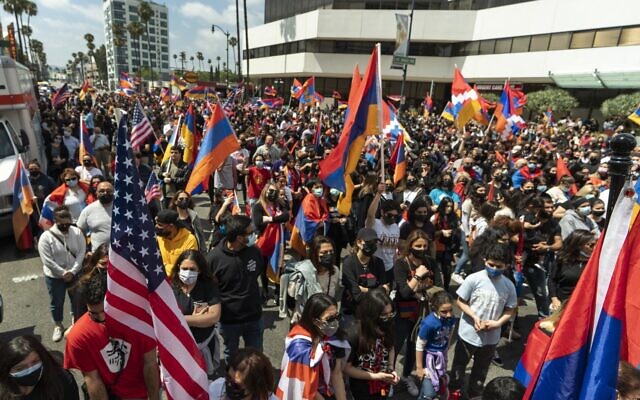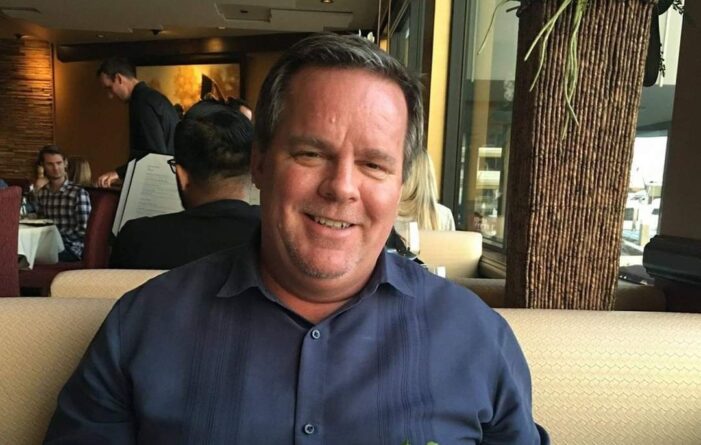Israel’s Foreign Ministry on Saturday said it recognized the “terrible suffering and tragedy of the Armenian people,” but stopped short of recognizing the early 20th century massacres carried out by the Ottoman Empire as a genocide.
“In these days in particular, we and the nations of the world have the responsibility to ensure that events like this do not again occur,” it said in a statement.
The statement came after US President Joe Biden recognized the Armenian genocide, the first American president to do so.
Yesh Atid party leader Yair Lapid praised the move, saying that it was “an important moral statement by Biden.”
“I will continue to fight for Israeli recognition of the Armenian Genocide, it is our moral responsibility as the Jewish state,” Lapid added.
Biden’s move was a watershed moment for descendants of the hundreds of thousands of dead as he defied decades of pressure by Turkey.
Biden had informed Turkish leader Recep Tayyip Erdogan of the decision a day earlier.
“We remember the lives of all those who died in the Ottoman-era Armenian genocide and recommit ourselves to preventing such an atrocity from ever again occurring,” Biden said. “We affirm the history. We do this not to cast blame but to ensure that what happened is never repeated.”
The statement is a massive victory for Armenia and its extensive diaspora. Starting with Uruguay in 1965, nations including France, Germany, Canada and Russia have recognized the genocide, but a US statement has been a paramount goal that proved elusive under previous presidents.

Members of the Armenian- American community join religious leaders at a religious ceremony remembering the victims of the Armenian Genocide at the Montebello Armenian Genocide Monument in Montebello, California, Saturday, April 24, 2021 (AP Photo/Damian Dovarganes)
Erdogan, in a statement to the Armenian patriarch in Istanbul, said debates “should be held by historians” and not “politicized by third parties.”
“Words cannot change or rewrite history,” Turkish Foreign Minister Mevlut Cavusoglu tweeted moments after Biden’s statement. “We will not take lessons from anyone on our history.”
Turkey’s foreign ministry on Saturday night summoned US Ambassador David Satterfield to protest Biden’s use of the term.
Meanwhile, Armenian Americans celebrated the news, saying the recognition was long overdue.
His action came after decades of activism, most of which was centered in California, home of the largest Armenian community in the nation.
“He’s the first American president to have the guts to talk about it. I never understood why the US waited this long when they knew the truth about what happened. It’s amazing and I’m very happy he did what he did,” said Varoujan Kioudjian, 74.
He was among hundreds of people who streamed to a hilltop monument in Montebello, about 10 miles east of downtown Los Angeles, to mark Armenian Genocide Remembrance Day.

Armenian-Americans hold a rally to commemorate the Armenian genocide in Beverly Hills, California, Saturday, April 24, 2021 (AP Photo/Damian Dovarganes)
Dressed in black for the solemn ceremony, they laid flowers around a tomb and said prayers for the estimated 1.5 million Armenians who were killed in the events beginning in 1915 known as Metz Yeghern.
Kioudjian said for as long as he can remember his late father, whose parents were killed in the genocide and who grew up in an orphanage, took him to memorials and demonstrations every April 24. That was the day in 1915 when Ottoman authorities began arresting Armenian intellectuals and community leaders in Constantinople, now known as Istanbul.
“The day April 24 comes around, tears flowed from his eyes, from his heart. It was that sad,” he said.
The White House had avoided using using the term genocide for decades for fear of alienating Turkey, a NATO ally and important power in the Middle East. Biden followed through on a campaign promise to make human rights a central guidepost of his foreign policy. He argued last year that failing to call the atrocities against the Armenian people a genocide would pave the way for future mass atrocities.
Biden’s call with Erdogan was his first since taking office more than three months ago. The delay had become a worrying sign in Ankara; Erdogan had a good rapport with former president Donald Trump and had been hoping for a reset despite past friction with Biden.

Armenian-American march to a rally to commemorate the Armenian genocide in Beverly Hills, California, Saturday, April 24, 2021 (AP Photo/Damian Dovarganes)
Erdogan reiterated his long-running claims that the US is supporting Kurdish fighters in Syria who are affiliated with the Iraq-based Kurdistan Workers’ Party, known as the PKK. The PKK has led an insurgency against Turkey for more than three decades. In recent years, Turkey has launched military operations against PKK enclaves in Turkey and in northern Iraq and against US-allied Syrian Kurdish fighters. The State Department has designated the PKK a terrorist organization but has argued with Turkey over the group’s ties to the Syrian Kurds.
According to the Turkish government statement after the call, Erdogan also raised concerns about the presence in the United States of cleric Fethullah Gulen, who is accused by Turkey of orchestrating a failed 2016 coup attempt. Gulen, who has lived in Pennsylvania since the late 1990s, denies involvement in the coup.
Biden, during the campaign, drew ire from Turkish officials after an interview with The New York Times in which he spoke about supporting Turkey’s opposition against “autocrat” Erdogan. In 2019, Biden accused Trump of betraying US allies, following Trump’s decision to withdraw troops from northern Syria, which paved the way for a Turkish military offensive against the Syrian Kurdish group. In 2014, when he was vice president, Biden apologized to Erdogan after suggesting in a speech that Turkey helped facilitate the rise of the Islamic State group by allowing foreign fighters to cross Turkey’s border with Syria.
Related posts:
Views: 0
 RSS Feed
RSS Feed

















 April 25th, 2021
April 25th, 2021  FAKE NEWS for the Zionist agenda
FAKE NEWS for the Zionist agenda 



 Posted in
Posted in  Tags:
Tags: 
















